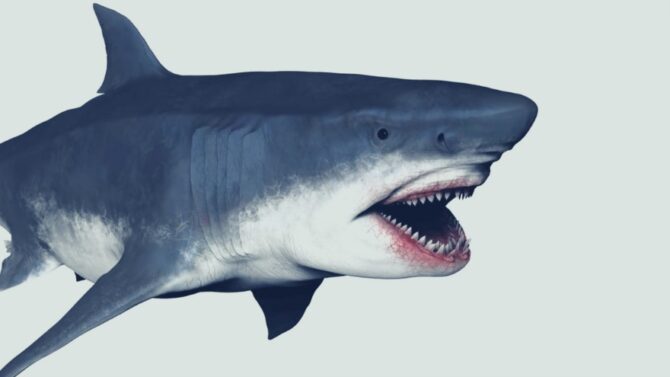Once upon a time, huge sharks known as megalodons lived in our oceans.
They are believed to have grown more than 50 feet in length, which makes them the biggest shark ever discovered. However, they have gone extinct.
Because megalodons have no skeleton, we don’t have as many fossils on them as we do on dinosaurs.
This leaves us wondering, what killed the megalodon shark?
In the absence of direct evidence, some theories have been brought forward as possible causes of the megalodon’s extinction. Climate change and a supernova are two theories.
But exactly how did megalodon go extinct? Let’s explore the possible reasons.
Megalodon: An Overview
The megalodon (Otodus megalodon) is a species of mackerel shark that has since gone extinct.
What we have on this creature are teeth fossils found in different parts of the world except for Antarctica.
These fossils are huge, leading to the name “megalodon,” which means “big tooth.”
The scientific name of the megalodon was once Cacharodon megalodon.
This is because the megalodon was once thought to be related to the great white shark and a part of the Cacharodon genus.
That changed after this creature was reclassified into the Otodontidae family from the Lamnidae.
Due to its large teeth, experts concluded that the megalodon was a huge creature, one of the largest to have existed.

However, its appearance and size are uncertain. Studies indicate that it was a predator, possibly feeding on large animals like seals, turtles, and even whales.
When Did Megalodons Live?
Megalodons are said to have existed around 23 to 3.6 million years ago in approximation.
The epochs it lived in are termed the Miocene and Pliocene. The former is known for changes in temperature, while the latter had a drier environment.
The megalodon lived from the early Miocene epoch through the middle and late years down to the Pliocene, covering around 13 million years. That’s a long time this creature lived.
Did Megalodons and Dinosaurs Meet?
The megalodon and the dinosaur are both fascinating prehistorical creatures that have since been subjects of numerous studies.
However, going by their dates, they may never have walked the earth at the same time.
Dinosaurs lived as far back as 245 to 223 million years ago, appearing during the Triassic Period.
They got extinct years before megalodons came into the scene, so there was no way both animals could have met.
That said, the megalodon might have been with some descendants of the dinosaurs, just like we have birds today.1
How Did Megalodons Go Extinct?
There is no consensus as to what killed the megalodon, but different theories exist as experts try to determine the cause.
Here are the major ones:
1. Climate change
Climate change is a leading theory for the extinction of megalodons, though in and of itself, it doesn’t seem like a strong case for the wiping out of giant sharks.
If it caused their extinction, it might have done so alongside other causes.
Climate change began during the Pliocene period, the final days of the megalodon.
The oceans got colder and unbearable for the warm-blooded megalodon. The reason no megalodon fossils were found in colder regions is that they couldn’t survive there.
Climate change could have affected their body regulation and even that of their prey, causing a loss in the food supply. This leads to the second point.
2. Reduced food supply
Climate change and its effects mentioned above led to the death of aquatic creatures, many of which are the prey of the megalodon.
This not only led to starvation but might have also increased competition between the megalodon and other predators at the time.
A BBC study suggests that the megalodon competed for resources with the great white shark, a “food fight” that might have left an impact on the large animal.2
3. Loss of habitat
This is also tied to climate change. The cooling of ocean temperatures meant that the megalodons struggled to live in a habitat that used to be at a comfortable temperature. This inevitably led to habitat loss.
Another cause tied to habitat loss is the disappearance of prey.
While some died, others moved out in search of a better place to stay. The lack of resources contributed to a loss of habitat.
4. Supernova
The final theory to explain the disappearance of the megalodon is a large explosion, almost like an asteroid, is said to have wiped off the dinosaurs.
This was suggested in the journal Astrobiology and reported by different sources, including Forbes.3 It is a more recent theory than others.
The research was led by Adrian Melott at the University of Kansas.
It points out that the evidence of a supernova occurring 2.6 million years coincided with the extinction of many sea species, including the megalodon.
Are there Megalodons Today?
Despite the lack of evidence, many argue that megalodons still exist. This rumor was perhaps influenced by The Meg, and it has persisted on the internet.
Proponents of this argue that a large part of the ocean—around 80%—is unexplored. Could it be that there’s at least a megalodon living in these waters?
Highly unlikely. Given the megalodon’s size estimated from the teeth, it is hard to imagine a huge animal staying undetected all these years.
The uncharted waters are also in colder areas where megalodons don’t survive well in.
Of course, if it so happens that a megalodon exists, it’ll be a massive discovery!
Conclusion
As more researchers study the existence and extinction of the megalodon, experts might reach a definite conclusion on what took out these big sharks.
For now, we stick with the various theories of climate change, the supernova, loss of habitat, and loss of prey.
References & Notes
- How Dinosaurs Shrank and Became Birds. Scientific American.
- Megalodon shark extinction may have been linked to great white competition. BBC News.
- Supernova Likely Killed Off Ancient Mega-Shark. Forbes.






